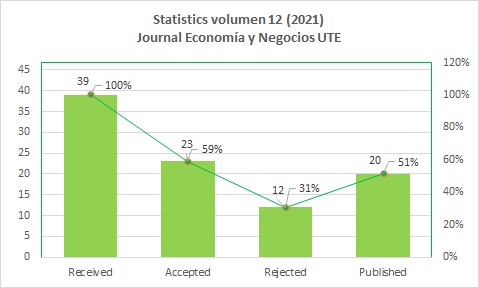Essential Skills for Ecuadorian Entrepreneur Success
DOI:
https://doi.org/10.29019/eyn.v12i2.970Keywords:
Entrepreneurships, Entrepreneurial skills, Business successAbstract
This article presents a study that determines the skills considered essential for entrepreneurs from a theoretical and practical point of view. For the development of this research, two phases were developed, the first was oriented to the analysis of the existing agreement between Ecuadorian entrepreneurs on the skills that, according to the analyzed literature, contribute to the success of a business; and the second to verify the agreement in the results obtained and validate the skills identified. The study involved 10 experts and 400 entrepreneurs, considered successful, to identify what they considered to be essential skills for the success of a venture based on skills recognized in the literature. The results made it possible to consistently identify the essential entrepreneurial skills in the Ecuadorian context with high statistical significance, which leads to suggest that these skills should be enhanced in the training of incipient entrepreneurs already consolidated in the market. Through the research, it was conclusively revealed that the entrepreneurs studied consider that these skills are facilitators of the success of their businesses, so their mastery could contribute to reduce the mortality rate of both new and established businesses.
Downloads
References
Ataei, P., Karimi, H., Ghadermarzi, H., & Norouzi, A. (2020). A conceptual model of entrepreneurial competencies and their impacts on rural youth's intention to launch SMEs. Journal of Rural Studies, 75, 185–195. https://doi.org/10.1016/j.jrurstud.2020.01.023
Borgatti, S. P. (1994). Cultural domain analysis. Journal of Quantitative Anthropology, 4, 261–278. https://bit.ly/3BR4C1l
Borgatti, S. P., Everett, M. G., & Freeman, L. C. (2002). Ucinet for Windows: Software for social network analysis. Analytic Technologies. https://bit.ly/2Yp9ywJ
Bustamante, K. P., & Cabrera, K. S. (2017). Microcrédito, microempresa y educación en Ecuador: Caso de estudio. Cantón Zamora. Espacios, 38(53), 25. https://bit.ly/3oj3z5w
Din, B. H., Anuar, A. R., & Usman, M. (2016). The effectiveness of the entrepreneurship education program in upgrading entrepreneurial skills among public university students. Procedia: Social and Behavioral Sciences, 224, 117–123. https://doi.org/10.1016/j.sbspro.2016.05.413
Gorgievski, M. J., Ascalon, M. E., & Stephan, U. (2011). Small business owners’ success criteria: A values approach to personal differences. Journal of Small Business Management, 49(2), 207–232. https://doi.org/10.1111/j.1540-627X.2011.00322.x
Hatthakijphong, P., & Ting, H. -I. (2019). Prioritizing successful entrepreneurial skills: An emphasis on the perspectives of entrepreneurs versus aspiring entrepreneurs. Thinking Skills and Creativity, 34, 100603. https://doi.org/10.1016/j.tsc.2019.100603
Horowitz, D. M. (2009). A review of consensus analysis methods in consumer culture, organizational culture and national culture research. Consumption Markets & Culture, 12(1), 47–64. https://doi.org/10.1080/10253860802560839
Instituto Nacional de Estadística y Censos de Ecuador (INEC). (2018). Tecnologías de la información y comunicación: Encuesta multipropósito-TIC 2018. INEC. https://bit.ly/3B4wXkz
Instituto Nacional de Estadística y Censos de Ecuador (INEC). (2019). Encuestas a empresas. INEC. https://bit.ly/3E1MqUa
Ismail, V. Y., Zain, E., & Zulihar. (2015). The portrait of entrepreneurial competence on student entrepreneurs. Procedia: Social and Behavioral Sciences, 169, 178–188. https://doi.org/10.1016/j.sbspro.2015.01.300
Kyndt, E., & Baert, H. (2015). Entrepreneurial competencies: Assessment and predictive value for entrepreneurship. Journal of Vocational Behavior, 90, 13–25. https://doi.org/10.1016/j.jvb.2015.07.002
Lacy, M. G., Snodgrass, J. G., Meyer, M. C., Dengah, H. J. F., & Benedict, N. (2018). A formal method for detecting and describing cultural complexity: Extending classical consensus analysis. Field Methods, 30(3), 241–257. https://doi.org/10.1177/1525822X18781756
Lasio, V., Ordeñana, X., Caicedo, G., Samaniego, A., & Izquierdo, E. (2018). Global Entrepreneurship Monitor: Ecuador 2017. ESPAE; ESPOL. https://bit.ly/3ESf3nd
Malhotra, N. K. (2008). Investigación de mercados (5.a Ed). Pearson Educación.
Morgan, S. L., Marsden, T., Miele, M., & Morley, A. (2010). Agricultural multifunctionality and farmers’ entrepreneurial skills: A study of Tuscan and Welsh farmers. Journal of Rural Studies, 26(2), 116–129. https://doi.org/10.1016/j.jrurstud.2009.09.002
Read, S., Sarasvathy, S., Dew, N., & Wiltbank, R. (2017). Effectual entrepreneurship (2.a Ed). Routledge.
Sanchez i Peris, F. J., & Ros Ros, C. (2014). Development of entrepreneurial competence through practicum in pedagogy degree. Procedia: Social and Behavioral Sciences, 139, 116–122. https://doi.org/10.1016/j.sbspro.2014.08.038
Schelfhout, W., Bruggeman, K., & De Maeyer, S. (2016). Evaluation of entrepreneurial competence through scaled behavioural indicators: Validation of an instrument. Studies in Educational Evaluation, 51, 29–41. https://doi.org/10.1016/j.stueduc.2016.09.001
Seuneke, P., Lans, T., & Wiskerke, J. S. C. (2013). Moving beyond entrepreneurial skills: Key factors driving entrepreneurial learning in multifunctional agriculture. Journal of Rural Studies, 32, 208–219. https://doi.org/10.1016/j.jrurstud.2013.06.001
Strauti, G., Dumitrache, V. -M., & Taucean, I. M. (2018). Entrepreneurial competences in economical engineering curriculum in Romania. Procedia: Social and Behavioral Sciences, (238), 737–742. https://doi.org/10.1016/j.sbspro.2018.04.057
Usman, A. S., & Tasmin, R. (2015). Entrepreneurial skills development strategies through the mandatory students’ industrial work experience scheme in Nigeria. Procedia: Social and Behavioral Sciences, 204, 254–258.
Zambrano, J., & Lasio, V. (2019). Jóvenes emprendedores en Ecuador 2012-2017. GEM; ESPAE.
Zamora-Boza, C. S. (2018). La importancia del emprendimiento en la economía: el caso de Ecuador. Espacios, 39(7), 15. https://bit.ly/3kbHXqI
Downloads
Published
How to Cite
Issue
Section
Categories
License
Copyright (c) 2021 The Authors

This work is licensed under a Creative Commons Attribution 3.0 Unported License.
The articles and research published by the UTE University are carried out under the Open Access regime in electronic format. By submitting an article to any of the scientific journals of the UTE University, the author or authors accept these conditions.
The UTE applies the Creative Commons Attribution (CC-BY) license to articles in its scientific journals. Under this open access license, as an author you agree that anyone may reuse your article in whole or in part for any purpose, free of charge, including commercial purposes. Anyone can copy, distribute or reuse the content as long as the author and original source are correctly cited. This facilitates freedom of reuse and also ensures that content can be extracted without barriers for research needs.
Creative Commons Attribution 4.0 International License
The Journal Economía y Negocios is distributed under a
Creative Commons Attribution 4.0 International (CC BY 4.0).

In addition, the journal Economía y Negocios guarantees and declares that authors always retain all copyrights to the original published works without restrictions [© The Author(s)]. Acknowledgment (BY): Any exploitation of the work is allowed, including a commercial purpose, as well as the creation of derivative works, the distribution of which is also allowed without any restriction.















